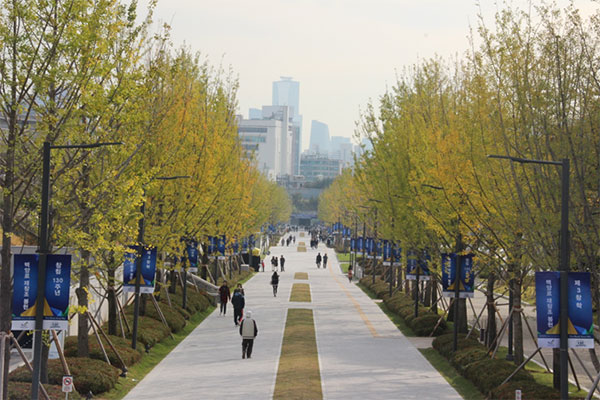Searching for a student-centered environment in the new Baekyang-ro

HOW CAN universities encourage students to enjoy their university life? The answer is that the university should provide better studying environments for students and prioritize the students’ needs over financial interests. Yonsei University has done so to some degree, as it continually tried to provide space for students by constructing the Yonsei-Samsung Library where students can more easily reserve seats and use meeting rooms for group projects. However, recently, Yonsei University finished the construction of Baekyang-ro and created a beautiful campus. Yet, did the Baekyang-ro project have students’ needs in mind?
The answer is no. The newly reconstructed Baekyang-ro does not provide enough space for students to use freely and rather seems to be focused on constructing a beautiful landscape. As a result, most students complain about the lack of space for them to study, which has led them to utilize private meeting rooms outside campus. Rather than considering how it looks like on the outside, the university should have pondered on how the space could be utilized to increase students’ productivity. For example, in Google Campus, all facilities are designed to provide comfortable working environments through open space which is starkly different from the normal office space that is divided with cubicles. Furthermore, meeting tables placed at the walkway encourage the employees to debate freely outside their offices. As a result, employees in Google Co. freely exchange their opinions anytime and anywhere, generating new ideas and enhancing the company’s productivity.
Likewise, if Yonsei University focused more on how the new space in Baekyang-ro could be utilized, students would be able to study more efficiently. For example, instead of “The Lounge” which provides luxury services with expensive price, Yonsei University could provide extra space in Baekyang-ro for students to foster an exchange of ideas. This may encourage students to develop their own innovative ideas, which may serve as an opportunity to start venture enterprises.
In addition to the lack of space, Yonsei Co-op is another aspect that needs to be reformed to provide better services for students. Instead of placing franchise stores in order to earn profits from their rent, the university should vitalize the Yonsei Co-op which benefits students from its extra profit. By using the Yonsei Co-op system, students can purchase what they need with reasonable prices. However, at the same time, many students doubt whether the organization actually provides better taste or more variety compared to the franchised stores. Thus, the problem will not be solved by merely replacing franchise stores with Yonsei Co-op stores. Only by being conscious of the challenges it faces and making the changes from inside could the Yonsei Co-op build a more beneficial system to students. In fact, the sales of franchise stores in the Baekyang-ro have been actually increasing and Yonsei Co-op should not overlook this phenomenon. The long queue of students waiting in Starbucks at lunch time is evidence of the popularity of franchise stores at Yonsei University. Furthermore, products sold in Yonsei Co-op are RS ed byr period, strateswhaent,e to political es. tributes to e talk to hate Americans th or die, and by telling it is becno longer cheap compared to those of other franchise stores, and the menus have not changed in the past five years. In fact, some menus in Yonsei Co-op. store are even more expensive than those in franchise stores.
Therefore, rather than overlooking these issues, Yonsei Co-op should make an effort to improve the quality of its products and services through intensive research. For instance, Yonsei Co-op could frequently gather students’ opinion about their satisfaction level and receive feedback.
The Yonsei Co-op system is an exemplary case in which the university has worked for the well-being of the students. Established in 1983, Yonsei Co-op was the first cooperative to be established in a South Korean university and effectively promoted the students’ welfare. Furthermore, corresponding to the start-up boom which addresses the increasing need for creativity and diversity, additional space where students can freely use and easily share their ideas will create creative leaders in diverse fields. By developing Yonsei Co-op system and creating space for the students, I hope that Yonsei University will continue to provide more opportunities to students and produce more talented students like it has done in the past.

